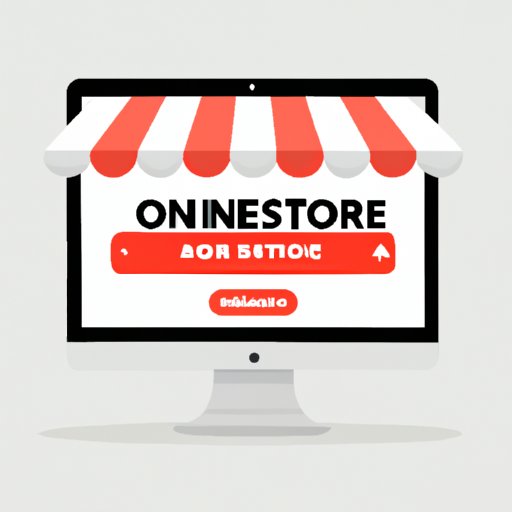
I. Introduction
Starting an online store has become a crucial part of running a business today. With the world shifting to digital, having an online presence can help you reach a wider audience and increase sales. In this article, we will provide a step-by-step guide to setting up your own online store, discuss the benefits of starting an online store, provide tips for successfully launching one, and cover the legal and financial aspects of opening an online store.
II. Step-by-Step Guide to Setting Up Your First Online Store
Setting up an online store can be overwhelming, but by breaking it down into manageable steps, you can launch your project with ease.
A. Start with choosing the right platform
There are many e-commerce platforms available to choose from, each with its pros and cons. Some popular options include Shopify, WooCommerce, and Magento. The choice ultimately depends on your needs and budget.
B. Setting up your store
After selecting a platform, the next step is to set up your store. You will need to choose a domain name and hosting provider, create a product catalog, set up pricing and shipping information, and customize your store’s design and layout.
C. Launching your first product
After setting up your store, it’s time to launch your first product. Before doing so, you will need to test your store and ensure everything works properly. Consider creating hype through social media and other channels and celebrate your success when making your first sale.
III. The Benefits of Starting an Online Store and Why You Should Try It
Running an online store has multiple benefits that can help take your business to the next level.
A. Lower overhead costs compared to brick-and-mortar businesses
Starting an online store eliminates the need for a physical storefront, thus eliminating many overhead costs such as rent, utilities, and insurance.
B. Ability to reach a wider audience
Having an online store allows you to reach customers worldwide by removing geographical limitations.
C. Flexibility to manage your business from anywhere
With an online store, you can manage your business from anywhere; all you need is internet access.
D. 24/7 availability to customers
An online store allows customers to shop at any time, day or night, increasing the potential for sales.
E. Examples of successful online stores to inspire readers
There are many successful online stores, such as Amazon and Zappos, that have paved the way for others and provide inspiration for all business owners.
IV. 10 Tips for Successfully Launching an Online Store
A. Develop a solid business plan
Define your target audience and niche market, establish a clear brand strategy, and set realistic financial goals.
B. Create a marketing plan
Use social media to build buzz, consider paid advertising options, and collaborate with influencers and other online businesses.
C. Optimize your website for conversions
Make sure your site is fast and mobile-friendly, improve product descriptions and images, and use clear calls to action and checkout processes.
D. Monitor your analytics and continually improve
Use data to identify areas for improvement, experiment with new marketing tactics and product offerings, and stay up to date with industry and consumer trends.
V. How to Create a Compelling Brand Image for Your Online Store
A strong brand image is crucial for building trust with customers and differentiating your store from competitors.
A. Importance of a strong brand image
A strong brand image differentiates your store from the competitors.
B. Elements of a consistent brand image
Choosing the right colors and fonts, creating a logo design that fits your store’s personality, and crafting a consistent tone of voice for your messaging are major elements for creating a brand.
C. Examples of successful online brands with memorable brand identities
Brands like Nike and Apple have memorable brand identities that stand out and resonate with customers.
VI. Navigating the Legal and Financial Aspects of Opening an Online Store
Starting an online store involves taking care of legal and financial aspects to protect your business and its customers.
A. Registering your business and obtaining necessary permits and licenses
Depending on your location, you may need to register your business and obtain the necessary permits and licenses.
B. Managing taxes and setting up an accounting system
Make sure you are aware of how to manage taxes and set up an accounting system before launching your store.
C. Securing payment processing and ensuring customer data privacy
Choose a secure payment processing system to protect your customers and ensure their data privacy.
D. Resources for additional advice and support
There are many resources available for those who need additional advice and support for setting up an online store, such as online forums and DIY guides.
VII. Conclusion
In conclusion, starting an online store offers many benefits and is a great opportunity for businesses to expand their reach and increase sales. By following these steps, tips, and advice, you can successfully launch your own online store. Don’t forget the importance of a strong brand identity, legal compliance, and continuous improvement. We hope this guide has provided a helpful roadmap for your online store journey.




